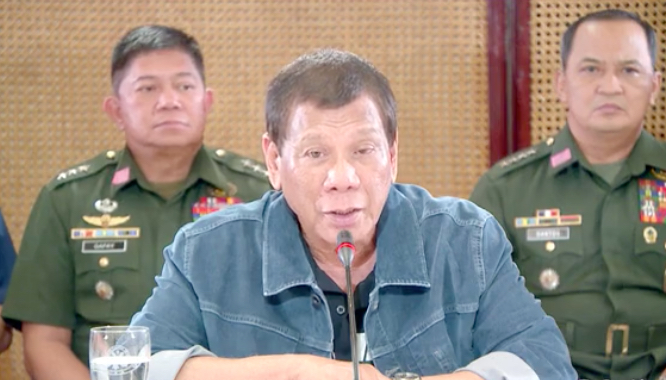President Rodrigo Duterte has placed travel restrictions on the entirety of Metro Manila from March 15 until April 14 after the Department of Health (DOH) raised its assessment of the coronavirus threat to Code Red Alert Sub-Level 2 — the highest local alert level — as three more people died of the disease.
All three patients who died were elderly and had pre-existing conditions. They included case PH5, a 62-year-old resident of Cainta, Rizal with diabetes and hypertension who frequented a Muslim prayer hall in Greenhills; and case PH6, his 59-year-old wife, who developed severe pneumonia. The entire town of Cainta will also be placed under quarantine starting March 15 following the deaths.
The third fatality, case PH37, is an 88-year-old resident of Pasig City with no recent travel outside the Philippines, who was reported to have existing hypertension. This brings the country’s total number of COVID-19 fatalities to five. On top of this, the DOH also reported three more new infections, bringing the country’s total COVID-19 cases to 52.
After meeting with the DOH’s Inter-Agency Task Force on Emerging Infectious Diseases (IATF-EID), Duterte addressed the country in a rambling speech last night announcing a “community quarantine” recommended by the DOH.
The chief executive said authorities didn’t want him to call it a lockdown to allay public fears — something he showed little interest in doing.
“For Manila, some say, ‘We don’t want to use that [term].’ But that’s because you’re afraid to call it a lockdown,” Duterte said in English and Filipino.
“But it’s a lockdown,” he continued.
IATF-EID’s recommendations that no one enter or leave Manila will be in place for the 30-day period, and will be evaluated every seven days. Duterte added that he may issue an executive order formalizing the agency’s recommendations and will be asking the Philippine National Police (PNP) and the Armed Forces of the Philippines to implement the measures. Earlier, the PNP said that it is prepared to deploy some 40,000 cops to enforce the lockdown.
“This is not martial law… it’s not even something extraordinary,” Duterte said, and added that sending cops to implement the measure was just to “exact [the public’s] compliance.”
In a bit of a head-scratcher, however, Department of Interior and Local Government Secretary Eduardo Año said in an interview with DZMM this morning that people from nearby cities and provinces employed in Metro Manila can still enter the city for work, provided that they go through designated checkpoints and show their company ID as proof that they’re working in the city. Preventive measures such as hand sanitation and temperature check will be enforced on the checkpoints.
Local government units outside Metro Manila, meanwhile, were told to put villages and municipalities under self-lockdown or quarantine if “at least two people” from different households have been infected with the virus. Provinces are also advised to impose quarantine if at least two people from different municipalities or cities contract the disease.
Duterte also ordered the suspension of government work in the executive branch, and classes at all levels in Metro Manila until April 12. Government agencies were asked to form skeleton staffs to ensure government services continue, while local governments outside Metro Manila are asked to exercise “sound discretion” on whether they’ll similarly suspend classes in their areas.
Health and emergency services are not covered by the announcement and will continue full operation.
The president also ordered travel bans on countries with reported cases of localized COVID-19 transmissions, including, among others, Thailand and Singapore. All foreign nationals coming from the countries will be barred entry into the Philippines, but Filipino citizens, their foreign spouses, their children, diplomats, and permanent resident visa holders are exempted. The country currently has a ban in place on travel to and from China and its special administrative regions Hong Kong and Macau, and South Korea.
Duterte also said that he might ask China — which has enforced a similar lockdown on several cities, including Wuhan, ground zero of COVID-19 — for help on handling the outbreak.
“You know, President Xi Jinping… wrote me a letter and said that he is willing to help. All we have to do is to ask,” he said adding that he will make the call “if things start to deteriorate.”
With nearly 81,000 recorded cases and more than 3,000 deaths, you’d think China had its hands full, but Duterte has long been known for his cozy relationship with the regional power.
Amid panic-buying and hoarding fueled by coronavirus fears, Duterte said in his speech: “So it’s there. It’s a serious situation. It’s very real…Do not minimize the situation, but I said do not kill yourself with worry, because [the] government is doing everything possible to make it at least controllable.”
“If you don’t cooperate the problem starts with you and ends with you,” he said.





Reader Interactions